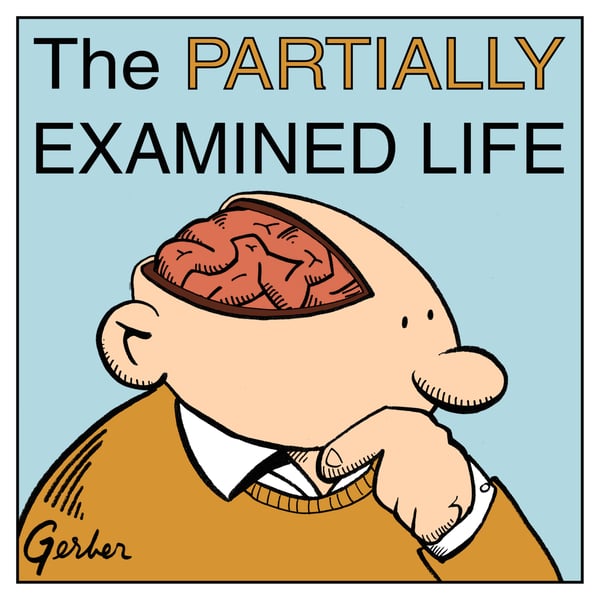Ep. 218: The Hard Problem of Consciousness (Chalmers et al) (Part Two)
The Partially Examined Life Philosophy Podcast
Mark Linsenmayer
4.6 • 2.3K Ratings
🗓️ 24 June 2019
⏱️ 50 minutes
🧾️ Download transcript
Summary
Continuing on "Consciousness and Its Place in Nature" by David Chalmers (2003).
We finish Chalmers's account of the types of physicialism, then move on to dualism (including epiphenomenalism), and finally dally with panpsychism, the specialty of our guest, Gregory Miller from the Panpsycast.
Listen to part 1 first or listen to the unbroken, ad-free Citizen Edition. Please support PEL!
End song: "Georgia Hard" by Robbie Fulks, as interviewed on Nakedly Examined Music #36.
Transcript
Click on a timestamp to play from that location
| 0:00.0 | Partially examine life relies on your support. To find out how to help, |
| 0:03.3 | in ways that are cheap or even free for you, check out partiallyexaminedlife.com-support. |
| 0:16.0 | You're listening to the Partially examined life episode 218 on the hard and harder problem |
| 0:20.8 | of consciousness we've been discussing. To this point, David Chalmer's consciousness and his |
| 0:25.3 | place in nature 2003, we continue to be joined by PENCYCAST representative Gregory Miller. |
| 0:31.7 | Yeah, so where do we want to start? I think the reign of our discussion of this Chalmers paper, |
| 0:34.7 | we at least have to get out the different types of materialism, the different types of dualism, |
| 0:39.2 | etc. that he lays out. Well, I guess the most obvious one to start with, and the most naturalist |
| 0:44.9 | to start with, A, and that's Taipei materialism, and this is what historically people might have |
| 0:49.8 | called A-Priori materialism or A-Priori physicalism. And the easiest way to understand this view |
| 0:56.7 | is just to say, well, all those arguments that Chalmers gives where you move from an epistemic claim |
| 1:02.8 | about the epistemic gap between the physical and consciousness, they just deny that that gap |
| 1:08.8 | exists, right? So the A-Priori physicalist or the type A materialist says, well, no, when Mary |
| 1:16.3 | is in her room, if she reads enough neuroscience and in enough detail, and with the correct scientific |
| 1:24.7 | theory, she does know what it's like to see red. When she leaves the room, she doesn't learn |
| 1:30.8 | anything new, she doesn't have a new fact, or they might say, zombies are inconceivable. |
| 1:37.9 | If I have the proper concept of a thing that is identical to me, wholly physically identical to me, |
| 1:44.7 | then I can't have that thing lacking conscious experience. And likewise, they say, well, when it comes |
| 1:51.3 | to the kind of explanatory gap argument, explaining the structure and function in that much detail, |
| 1:59.0 | and with the right theory, does entail facts about consciousness. So pain is identical to C-Fibers, |
| 2:07.6 | is just as clear and is just as transparent, let's say, as Walter is H2O. That's the idea. |
| 2:14.8 | So yeah, like with the knowledge argument, she clearly has a different experience when she leaves |
... |
Please login to see the full transcript.
Disclaimer: The podcast and artwork embedded on this page are from Mark Linsenmayer, and are the property of its owner and not affiliated with or endorsed by Tapesearch.
Generated transcripts are the property of Mark Linsenmayer and are distributed freely under the Fair Use doctrine. Transcripts generated by Tapesearch are not guaranteed to be accurate.
Copyright © Tapesearch 2025.

